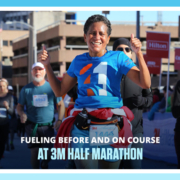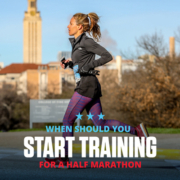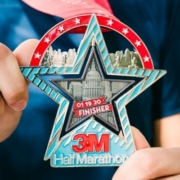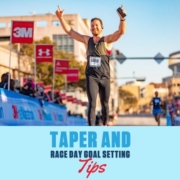Fueling before and on course at 3M Half Marathon
Whether you’re an experienced runner or a first-timer taking on 13.1 miles, it’s important to fuel your body with the right nutrition both before and during your race. In this post, we’ll look at some of the best fueling options, so that come race day you can be sure that your energy levels will stay high and that you have all the nutrients necessary for a successful finish line ahead!
Following GU’s nutrition planner can help you perform your best
You train for months to chase your 13.1-mile PR at 3M Half Marathon. GU Energy Labs, the Official Energy Gel and Chew of 3M Half Marathon, is here to help you perform your best! Their products are scientifically proven to give you the energy you need.
Energy Zone: Located at Mile 7 GU will have an energy zone stocked with:
- Gels and chews: Lemon Sublime, Salted Watermelon (Caffeine), Vanilla Bean (Caffeine), and Orange Energy Chews.
But it is not all about race day. What you do in the days leading up can also impact your performance on the course. Below we will provide some tips and information that you can do before the race.
Fueling Before Running a Half Marathon
During the week before you run a half marathon, you need to focus on both hydration and providing sufficient energy/fueling. Your calorie intake will be higher than usual and you will increase your carb load. It is also important that you hydrate in the week leading up to race day. You can supplement your water intake with nuun hydration to make sure you are getting the electrolytes your body needs to be sufficiently hydrated come race morning.
When you combine carbohydrate loading and tapering your workouts, you can store more energy in your muscles which will give you more energy sources during your event.
The Mayo Clinic suggests that carb-loading begins one week before the event with another additional increase 1-3 days out. ” Increase your carbohydrate intake to about 8 to 12 grams of carbohydrate per kilogram of body weight. Cut back on foods higher in fat to compensate for the extra carbohydrate-rich foods. Also, scale back your training for three to four days before the event. The combination of eating more carbohydrates and tapering activity appears to boost muscle glycogen stores.
For most athletes, 5 to 7 grams of carbohydrate per kilogram of body weight daily is right for general training. (Note that 1 kilogram equals 2.2 pounds.) Endurance athletes may need up to 12 grams per kilogram.”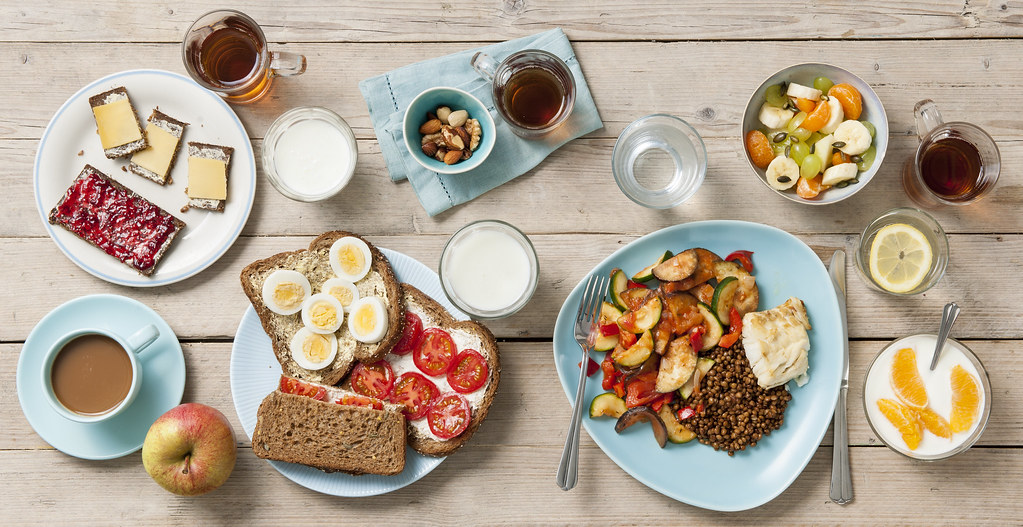
To give you an idea of carb counts, these foods have 15 grams of carbohydrates:
- One slice of bread
- One 6-inch tortilla
- 1/2 cup mashed potatoes
- 1/2 medium baked potato or sweet potato
- 1/3 cup rice
- One small apple
- Two tangerines
- 2 tablespoons raisins
- 1/2 cup orange juice
- 3 cups green beans
- 1 1/4 cup milk or yogurt
On race morning you will want to rise early so that you can eat at least 2-3 hours before your start time. This will allow you to digest and not have a heavy stomach. Oversleep? Don’t panic, go with a lighter meal with supplemented liquid or gel carbs.
On Course Fueling Advice & Half Marathon Nutrition Planner
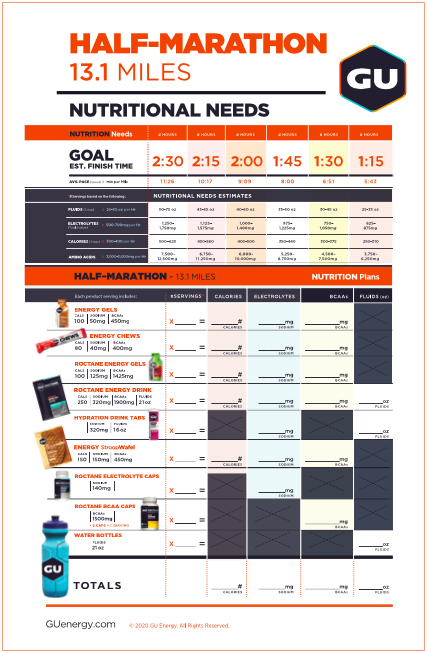 Here are some tips for making sure you’re giving your body what it needs so you perform your best on race day. Planning what to eat during a race can be overwhelming. With so many variables, it’s hard to determine what the “right” answer is for you. When deciding what to eat and drink, we think it’s helpful to break it down by looking at the nutrients your body needs.
Here are some tips for making sure you’re giving your body what it needs so you perform your best on race day. Planning what to eat during a race can be overwhelming. With so many variables, it’s hard to determine what the “right” answer is for you. When deciding what to eat and drink, we think it’s helpful to break it down by looking at the nutrients your body needs.
A successful nutrition plan takes into account the number of calories your system can handle in an hour. It should also factor in your body’s need for electrolytes, amino acids, water, and protein. When thinking about your nutritional need for a race or training session, it’s important to remember that everyone is different. Every day is different. For example, body size, air temperature, activity type, intensity, and personal preference will affect your nutritional needs.
That’s why we recommend mixing and matching products to find out what works for you. For example, if you prefer to drink your calories, you can bottle up your fuel using ROCTANE Energy Drink. We developed a half marathon Nutrition Planner to help you dial in your plan for race day. We all know things can change on race day, but it helps to start with a plan! Download the Nutrition Planner and follow the steps below.
Here’s how to use our Nutrition Planner
- Pick your goal finishing time and find out what your average pace will be
- Use the table to determine your total nutritional need for the event
- Mix and match your favorite products and flavors, then calculate your totals
- Make sure your plan meets your body’s demand for each nutritional element

